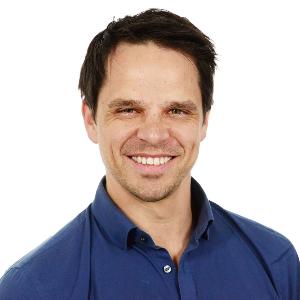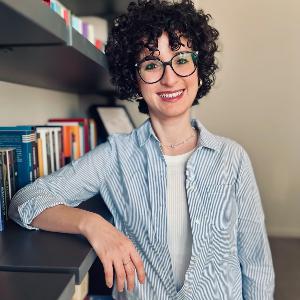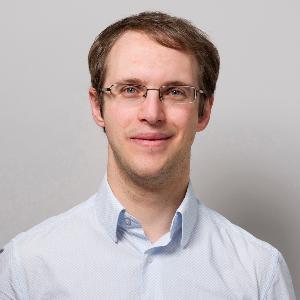DFG funding for three LMU researchers
4 Jun 2025
Neonatologist Vincent Gaertner, molecular biologist Marta Russo, and psychologist Alexander Soutschek receive funding from the Emmy Noether and Heisenberg programs.
4 Jun 2025
Neonatologist Vincent Gaertner, molecular biologist Marta Russo, and psychologist Alexander Soutschek receive funding from the Emmy Noether and Heisenberg programs.
The first breaths of newborns, metabolic enzymes in the cell nucleus, and decision-making under mental effort – the German Research Foundation (DFG) is awarding four LMU researchers through the Emmy Noether and Heisenberg programs for their research in these areas.

Dr. Vincent Gaertner is a pediatrician at the Dr. von Hauner Children’s Hospital. | © Klinikum der Universität München
Neonatologist Dr. Vincent Gaertner is a pediatrician at the Dr. von Hauner Children’s Hospital. For his research, the German Research Foundation has awarded him funding of more than three million euros through its Emmy Noether program.
Dr. Vincent Gaertner’s research project “From EAGLE to LEOPARD” is about one of the most critical moments in a person’s life: the first breaths directly after birth. For premature babies in particular, this transition from the protected environment of the womb to autonomous breathing is a major challenge.
Gaertner’s team wants to gain a better understanding of exactly how this adjustment works and how to optimally support the breathing of premature babies in the delivery room. To this end, they are using an innovative technique called electrical impedance tomography (EIT). With a special chest strap that measures the distribution of air in the lungs in real time, the neonatologist records the first breaths of premature and full-term neonates immediately after birth and analyzes the data.
Among other things, Gaertner investigates the influence of the delivery mode, of the timing of umbilical cord clamping, and various forms of respiratory support on lung function. The results are used to support a large-scale clinical study – with the goal of improving respiratory care in the delivery room to be more targeted, effective, and gentle. In this way, he wants to effect lasting improvements in the survival and development chances of premature babies.

Dr. Marta Russo is a new research group leader at LMU’s Biomedical Center (BMC). | © privat
Molecular biologist Dr. Marta Russo is a new research group leader at LMU’s Biomedical Center (BMC). She has been awarded 2.1 million euros in funding through the German Research Foundation’s Emmy Noether Program.
Marta Russo's research focuses on a largely unexplored aspect of gene regulation: how metabolism in the cell nucleus can influence gene activity. For more than 100 years, metabolic pathways were studied almost exclusively in other compartments, particularly in the mitochondria. However, recent discoveries – including her own – have shown that important metabolic enzymes involved in the production of acyl-CoAs can also be located in the cell nucleus.
The metabolites produced by these enzymes are not only metabolic intermediates, but also play an important role in modifying histones, the proteins that package DNA, and thus help to control which genes are switched on or off. In her Emmy Noether-funded project “Nuclear synthesis of acyl-CoAs in the reprogramming of chromatin and gene activity,” Marta Russo is investigating how such metabolic enzymes influence gene expression.
Her laboratory combines genomics, proteomics, metabolite profiling, and advanced imaging techniques in a multidisciplinary approach to understand how nuclear metabolism interacts with the transcriptional apparatus. Macrophages, immune cells known for their rapid and dynamic transcriptional and metabolic changes, serve as the primary model system. Through her research, Marta Russo aims to shed light on how nuclear metabolism contributes to cellular identity, immune responses, and the development of human diseases.

Dr. Alexander Soutschek leads an Emmy Noether Junior Research Group at LMU’s Department of Psychology.
Psychologist Dr. Alexander Soutschek leads an Emmy Noether Junior Research Group at LMU’s Department of Psychology. For his research, he has now been awarded funding of some 600,000 euros through the Heisenberg Program.
Alexander Soutschek employs neuroscientific methods to investigate how mental effort influences human decision-making behavior – and what role cerebral metabolism plays in this process. Mental effort is an everyday phenomenon: When you concentrate intensely over a protracted period – when writing scientific papers, for example – you become mentally tired – and often lose motivation for further demanding tasks. But what exactly happens in the brain when we are engaged in strenuous mental activity? And why does this effort lead to fatigue? Soutschek is exploring these questions in his new research project.
New theoretical approaches are attempting to explain the fatigue triggered by mental effort neurobiologically via metabolic changes in the prefrontal cortex – the part of the brain responsible, among other things, for planning and decision-making. Using non-invasive brain stimulation and measurements of cerebral metabolism, Soutschek plans to experimentally test this hypothesis.
In the second part of the project, he will investigate how mental effort affects decisions in various contexts – such as individual or social decision-making. The goal of his research is to obtain a deeper understanding of the neurobiological foundations of mental fatigue and its influence on decision-making processes.